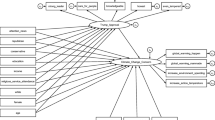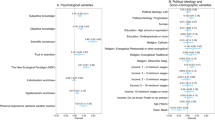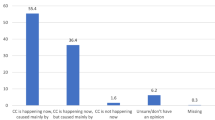Abstract
This study uses public opinion data from 2006 to 2014 to examine the effect of unemployment and partisan identity on attitudes towards anthropogenic climate change. Results show that while Republican partisanship and conservative ideology are strongly associated with lower reported belief in anthropogenic climate change, these attitudes are also shaped by subjective perceptions of economic risk and increased local unemployment rates. I find that exposure to economic risk increases the likelihood of climate change denial among both Democrats and Republicans. These findings help explain trends in environmental public opinion over the past decade, in particular the increase in reported denial or skepticism about climate change after the 2008 economic recession.






Similar content being viewed by others
Notes
5.69% of respondents provided a response of “Don’t know” or “No response” to the first question. These respondents were included with those who responded “No” (1), consistent with variable coding in Egan and Mullin (2012) as they did not indicate agreement with the scientific consensus for climate change. 9.52% of respondents provided a similar DK/NR response to the second question and were again coded alongside respondents (2) who did not indicate agreement with the scientific consensus on climate change.
The departure from mean temperature compares the temperature for each state in a particular month to that state’s temperature in the same months over a base period of 1950–1980. Data were obtained using NOAA’s Climate at a Glance database (NOAA 2017).
As the data is ordinal in nature, ordinal logistic regression was also used to estimate these parameters. However, Brant post-estimation tests confirm violation of the parallel regression assumption, and therefore ordinal logistic regression cannot be used. The variable is thus treated as multinomial/categorical instead of ordinal.
References
Anson IG (2016) Just the facts? Partisan media and the political conditioning of economic perceptions. Polit Res Q 69(3):444–456
Barron-Lopez L (2015) Senate votes 98-1 that climate change is real. The Hill. Retrieved from http://thehill.com/policy/energy-environment/230316-senate-votes-98-1-that-climate-change-is-real
Bord RJ, O’Connor RE, Fisher A (2000) In what sense does the public need to understand global climate change? Public Underst Sci 9(3):205–218
Boudet H, Clarke C, Bugden D, Maibach E, Roser-Renouf C, Leiserowitz A (2014) “Fracking” controversy and communication: using national survey data to understand public perceptions of hydraulic fracturing. Energy Policy 65:57–67
Boykoff MT, Boykoff JM (2004) Balance as bias: global warming and the US prestige press. Glob Environ Chang 14(2):125–136
Boykoff MT, Boykoff JM (2007) Climate change and journalistic norms: a case-study of US mass-media coverage. Geoforum 38(6):1190–1204
Brulle RJ, Carmichael J, Jenkins JC (2012) Shifting public opinion on climate change: an empirical assessment of factors influencing concern over climate change in the US, 2002–2010. Clim Chang 114(2):169–188
Bureau of Labor Statistics, U.S. Department of Labor, Occupational Outlook Handbook, State and Local Unemployment Rates, accessed via https://www.bls.gov/lau/
Campbell TH, Kay AC (2014) Solution aversion: on the relation between ideology and motivated disbelief. J Pers Soc Psychol 107(5):809
Boussalis C, Coan TG (2016) Text-mining the signals of climate change doubt. Glob Environ Chang 36:89–100
Cook J, Oreskes N, Doran PT, Anderegg WR, Verheggen B, Maibach EW et al (2016) Consensus on consensus: a synthesis of consensus estimates on human-caused global warming. Environ Res Lett 11(4):048002
Davenport C (2015) Senate rejects human role in climate change. The New York Times. Retrieved from http://www.nytimes.com/2015/01/23/us/politics/senate-rejects-human-role-in-climate-change.html
Demski C, Butler C, Parkhill KA, Spence A, Pidgeon NF, (2015) Public values for energy system change. Glob Environ Chang 34:59–69
Ditto PH, Lopez DF (1992) Motivated skepticism: use of differential decision criteria for preferred and nonpreferred conclusions. J Pers Soc Psychol 63(4):568
Duch RM, Stevenson R (2005) Context and the economic vote: a multilevel analysis. Polit Anal 13(4):387–409
Dunlap RE, Jacques PJ (2013) Climate Change Denial Books and Conservative Think Tanks. Am Behav Sci 57(6):699–731
Dunlap RE, McCright AM, Yarosh JH (2016) The political divide on climate change: partisan polarization widens in the U.S. Environ Sci Policy Sustain Dev 58(5):4–23
Dunning D, Leuenberger A, Sherman DA (1995) A new look at motivated inference: are self-serving theories of success a product of motivational forces? J Pers Soc Psychol 69(1):58
Egan PJ, Mullin M (2012) Turning personal experience into political attitudes: the effect of local weather on Americans’ perceptions about global warming. J Politics 74(03):796–809
Hamilton LC (2011) Education, politics and opinions about climate change evidence for interaction effects. Clim Chang 104(2):231–242
Jacques PJ, Dunlap RE, Freeman M (2008) The organisation of denial: Conservative think tanks and environmental scepticism. Environ Politics 17(3):349–385
Kahn ME, Kotchen MJ (2011) Business cycle effects on concern about climate change: the chilling effect of recession. Climate Change Econ 2(03):257–273
Raimi KT, Leary MR, (2014) Belief superiority in the environmental domain: Attitude extremity and reactions to fracking. J Environ Psychol 40:76–85
Krosnick JA, MacInnis B (2013) Does the American public support legislation to reduce greenhouse gas emissions? Daedalus 142(1):26–39
Krosnick JA, Holbrook AL, Lowe L, Visser PS (2006) The origins and consequences of democratic citizens’ policy agendas: a study of popular concern about global warming. Clim Chang 77(1–2):7–43
Kunda Z (1990) The case for motivated reasoning. Psychol Bull 108(3):480
Lebo MJ, Cassino D (2007) The aggregated consequences of motivated reasoning and the dynamics of partisan presidential approval. Political Psychol 28(6):719–746
Leiserowitz AA (2005) American risk perceptions: is climate change dangerous? Risk Anal 25(6):1433–1442 Leiserowitz 2014
Leiserowitz A, Maibach E, Roser-Renouf C, Smith N (2011) Climate change in the American mind: Americans’ global warming beliefs and attitudes in May 2011. Yale University and George Mason University. Yale Project on Climate Change Communication, New Haven Accessed 9 Dec 2012
Leiserowitz A, Maibach E, Roser-Renouf C, & Hmielowski JD (2012) Extreme weather, climate & preparedness in the American mind. Yale University and George Mason University. New Haven, CT, Yale Project on Climate Change Communication
Leiserowitz AA, Maibach EW, Roser-Renouf C, Smith N, Dawson E (2013) Climategate, public opinion, and the loss of trust. Am Behav Sci 57(6):818–837
Li Y, Johnson EJ, Zaval L (2011) Local warming: Daily temperature change influences belief in global warming. Psychol Sci 22(4):454–459
Long JS, Freese J (2006) Regression models for categorical dependent variables using Stata. Stata Press, College Station
Maibach E, Myers T, Leiserowitz A (2014) Climate scientists need to set the record straight: there is a scientific consensus that human-caused climate change is happening. Earth’s Future 2(5):295–298
Malka A, Krosnick JA, Langer G (2009) The Association of Knowledge with Concern About Global Warming: Trusted Information Sources Shape Public Thinking. Risk Anal 29(5):633–647
Marquart-Pyatt ST, McCright AM, Dietz T, Dunlap RE (2014) Politics eclipses climate extremes for climate change perceptions. Glob Environ Chang 29:246–257
McCright A, Dunlap RE (2000) Challenging global warming as a social problem: an analysis of the conservative movement’s counter-claims. Soc Probl 47(4):499–522
McCright A, Dunlap R (2011) The politicization of climate change and polarization in the american public’s views of global warming, 2001-2010. Sociol Q 52:155–194
McCright AM, Dunlap RE (2013) Bringing ideology in: the conservative white male effect on worry about environmental problems in the USA. J Risk Res 16:211–226
NASA (2015). “Scientific Consensus: Earth’s Climate is Warming” Accessed via http://climate.nasa.gov/scientific-consensus
NOAA National Centers for Environmental Information, Climate at a Glance: U.S. Time Series (2017) Retrieved on September 3, 2017 from http://www.ncdc.noaa.gov/cag/
Norgaard KM (2006) “We don’t really want to know” environmental justice and socially organized denial of global warming in Norway. Organ Environ 19(3):347–370
Norgaard KM (2011) Living in denial: climate change, emotions, and everyday life. MIT Press, Cambridge
O’Connor RE, Bord RJ, Yarnal B, Wiefek N (2002) Who wants to reduce greenhouse gas emissions? Soc Sci Q 83(1):1–17
Oreskes N (2004) beyond the ivory tower: The Scientific Consensus on Climate Change. Science 306(5702):1686–1686
Schneider J, Schwarze S, Bsumek PK, Peeples J (2016) Under pressure: coal industry rhetoric and neoliberalism. Springer, Berlin
Scruggs L, Benegal S (2012) Declining public concern about climate change: can we blame the great recession? Glob Environ Chang 22(2):505–515
Shum RY (2012) Effects of economic recession and local weather on climate change attitudes. Clim Pol 12(1):38–49
Singer MM (2011) Who says “it’s the economy”? Cross-national and cross-individual variation in the salience of economic performance. Comp Pol Stud 44(3):284–312
Wood BD, Vedlitz A (2007) Issue definition, information processing, and the politics of global warming. Am J Polit Sci 51(3):552–568
Margalit Y (2013) Explaining Social Policy Preferences: Evidence from the Great Recession. Am Polit Sci Rev 107(01):80–103
Zaller J (1992). The Nature and Origins of Mass Opinion. Cambridge: Cambridge University Press
Zaval L, Keenan EA, Johnson EJ, Weber EU (2014) How warm days increase belief in global warming. Nat Clim Chang 4(2):143–147
Zia A, Todd AM (2010) Evaluating the effects of ideology on public understanding of climate change science: How to improve communication across ideological divides?. Public Underst Sc 19(6):743–761
Acknowledgements
I thank Thomas Hayes, Paul Herrnson, Lyle Scruggs, Matthew Singer, Gabriela Tafoya, Todd Vachon, and two anonymous reviewers for their helpful comments on earlier drafts.
Author information
Authors and Affiliations
Corresponding author
Rights and permissions
About this article
Cite this article
Benegal, S.D. The impact of unemployment and economic risk perceptions on attitudes towards anthropogenic climate change. J Environ Stud Sci 8, 300–311 (2018). https://doi.org/10.1007/s13412-017-0452-7
Published:
Issue Date:
DOI: https://doi.org/10.1007/s13412-017-0452-7




